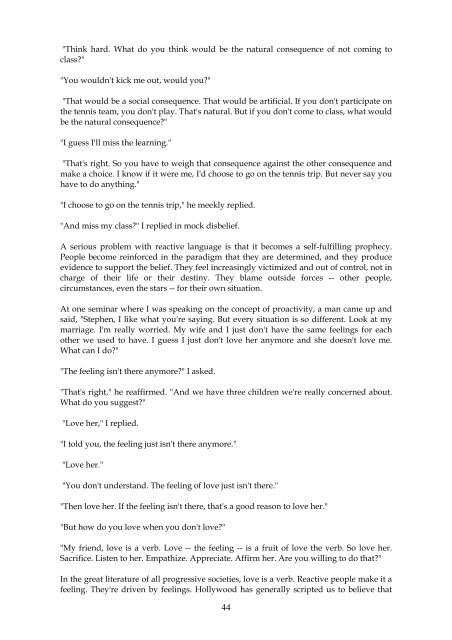Covey - The 7 habits of highly effective people
Create successful ePaper yourself
Turn your PDF publications into a flip-book with our unique Google optimized e-Paper software.
"Think hard. What do you think would be the natural consequence <strong>of</strong> not coming to<br />
class?"<br />
"You wouldn't kick me out, would you?"<br />
"That would be a social consequence. That would be artificial. If you don't participate on<br />
the tennis team, you don't play. That's natural. But if you don't come to class, what would<br />
be the natural consequence?"<br />
"I guess I'll miss the learning."<br />
"That's right. So you have to weigh that consequence against the other consequence and<br />
make a choice. I know if it were me, I'd choose to go on the tennis trip. But never say you<br />
have to do anything."<br />
"I choose to go on the tennis trip," he meekly replied.<br />
"And miss my class?" I replied in mock disbelief.<br />
A serious problem with reactive language is that it becomes a self-fulfilling prophecy.<br />
People become reinforced in the paradigm that they are determined, and they produce<br />
evidence to support the belief. <strong>The</strong>y feel increasingly victimized and out <strong>of</strong> control, not in<br />
charge <strong>of</strong> their life or their destiny. <strong>The</strong>y blame outside forces -- other <strong>people</strong>,<br />
circumstances, even the stars -- for their own situation.<br />
At one seminar where I was speaking on the concept <strong>of</strong> proactivity, a man came up and<br />
said, "Stephen, I like what you're saying. But every situation is so different. Look at my<br />
marriage. I'm really worried. My wife and I just don't have the same feelings for each<br />
other we used to have. I guess I just don't love her anymore and she doesn't love me.<br />
What can I do?"<br />
"<strong>The</strong> feeling isn't there anymore?" I asked.<br />
"That's right," he reaffirmed. "And we have three children we're really concerned about.<br />
What do you suggest?"<br />
"Love her," I replied.<br />
"I told you, the feeling just isn't there anymore."<br />
"Love her."<br />
"You don't understand. <strong>The</strong> feeling <strong>of</strong> love just isn't there."<br />
"<strong>The</strong>n love her. If the feeling isn't there, that's a good reason to love her."<br />
"But how do you love when you don't love?"<br />
"My friend, love is a verb. Love -- the feeling -- is a fruit <strong>of</strong> love the verb. So love her.<br />
Sacrifice. Listen to her. Empathize. Appreciate. Affirm her. Are you willing to do that?"<br />
In the great literature <strong>of</strong> all progressive societies, love is a verb. Reactive <strong>people</strong> make it a<br />
feeling. <strong>The</strong>y're driven by feelings. Hollywood has generally scripted us to believe that<br />
44


